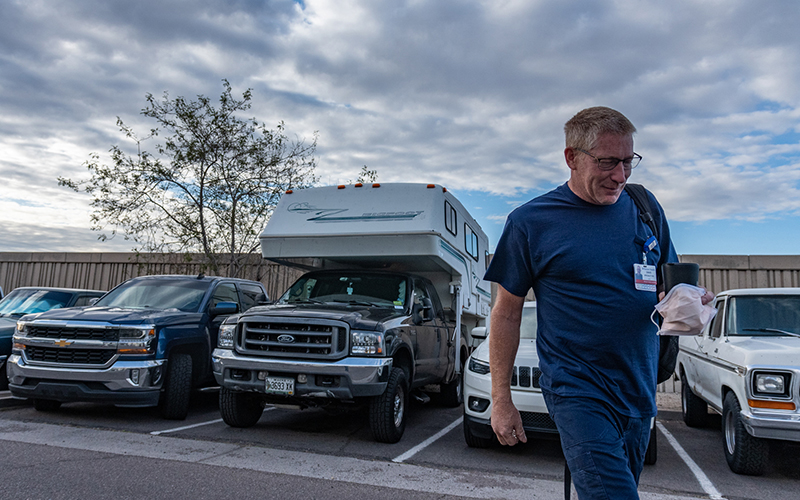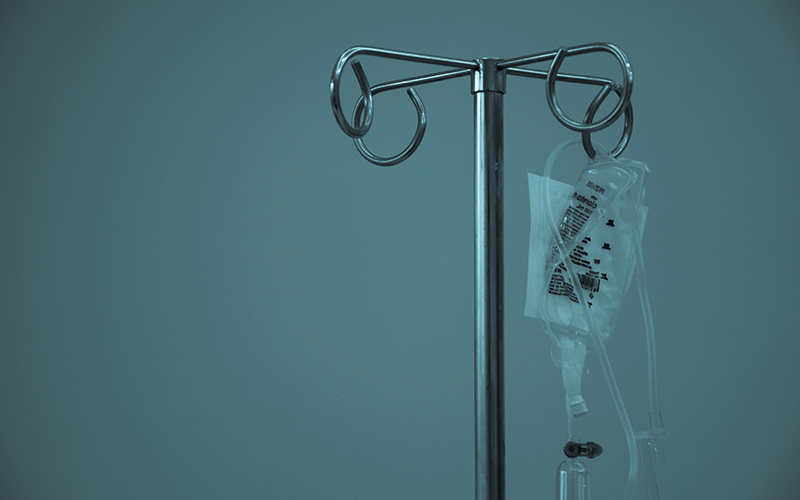PHOENIX – On one of her first days working in an Arizona hospital, Kelsi Shawd placed the bodies of COVID-19 patients into cadaver bags.
For months, Katherine Hall watched her patients suffer, not sure whether they would die or recover enough to go home.
Some nights, Johnathan Hopper drank 12 beers just to get to sleep after his shift ended at a New York hospital when the city was the epicenter of the pandemic in 2020.
“I’ve seen hundreds of people die,” Hopper said. “You can’t sleep, but you have to report to work the next day.”
Shawd, Hall and Hopper are among tens of thousands of travel nurses who have filled a growing health care staffing shortage exposed by a once in a generation pandemic.
Lured by lucrative contracts from a largely unregulated industry of staffing agencies, this nomadic workforce cycles between hot spots, adjusting to new work settings, different co-workers, unfamiliar assignments and long hours.
Travel nurses work as private contractors, taking assignments from staffing agencies that place them in hospitals across the country that are pressed for workers.
But after more than a year of witnessing unrelenting death and risking their own exposure on the front lines, some travel nurses are burning out. According to experts, the pandemic will have lasting repercussions on the temporary medical staffing sector and health care industry as a whole.
Rising demand
The $10 billion market for travel nurses was increasing before the pandemic was declared in March 2020, spurred by aging baby boomers, an opioid epidemic and the Affordable Care Act allowing more patients to seek care. Meanwhile, seasoned nurses were planning their retirements, leaving a growing void in the health care industry.
With the pandemic, the industry grew even more. In a recent poll of hospital executives by Avant Healthcare Professionals, 90% of more than 100 respondents reported using travel nurses to help with an influx of COVID-19 patients in 2020, compared with less than 60% in 2019.

Travel nurse Katherine Hall lives in an RV with her husband and blogs about their experience on the Instagram account hitched_and_halling. While she’s at work, he works remotely from the RV. (Photo courtesy of Katherine Hall)
On Dec. 2, when COVID-19 cases were surging across the country, there were more than 31,000 job openings for travel nurses, nearly half of which were shorter, more lucrative “crisis” positions. Demand had increased 44% over the previous month, according to Staffing Industry Analysts, a staffing advisory firm.
As shutdowns crashed the economy and unemployment soared, many core staff nurses sought crisis contracts on the front lines that reached $10,000 a week.
Because of the pandemic, hospitals lost about 30% of their core nursing staff to travel jobs, according to Brian Hudson, senior vice president at Avant Healthcare.
Arizona health care experts said Arizona nurses were among those who left staff positions to become travel nurses, although hospitals tried to incentivize them to stay.
Shawd, who’s from Illinois, said that in just one month at Banner Thunderbird Medical Center in Glendale, she witnessed about 20 staff nurses leave. As a travel nurse herself, Shawd said, she couldn’t blame them.
“COVID nurses made a significant amount more to go be a travel nurse, as opposed to being at their home hospital doing the exact same thing,” she said. “What are they going to do when the pandemic’s over? I don’t know.”
Stretched thin
Arizona scrambled to fill hospitals with health care workers to manage surging COVID-19 numbers by cross-training nurses to take intensive-care patients, increasing hospital bed capacities and expediting the nurse licensing process.
Gov. Doug Ducey issued an emergency declaration in March 2020, allowing the State Board of Nursing to quickly usher in registered nurses from other states to work in understaffed facilities.
The number of ICU jobs in Arizona from January to July 2020 jumped to about eight times the normal level, according to a study by NEJM Catalyst.
Even so, COVID-19 has forced nurses to take on more patients and heavier assignments, in some cases exceeding state regulations that establish limits of no more than two patients to every nurse in the ICU.
Banner-University Medical Center Tucson stated in a December email obtained through an Arizona Department of Health Services records request that “ICU staffing assignments are being pushed to a 1 nurse to 3 patients in many areas of the hospital.”
Nurse-to-patient ratios also were far above normal levels in Yuma, according to Elizabeth Lara, the administrative director for adult acute care and critical care at Yuma Regional Medical Center.
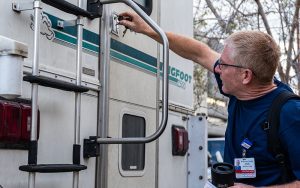
Travel nurse David Ryan says frontline workers faced working conditions during the pandemic that he’d never imagined. “I’ve held way more hands, in the last year, during their last breath, than I did for eight years before.” (Photo by Isaac Stone Simonelli/Special for Cronkite News)
“We were so short on nurses nationwide,” Lara said. “We were, at some times, one to four, one to five.”
Hopper, who spent nine months in Phoenix as a travel nurse, likened ICU nurses to the “special forces” of the nursing world – a workforce he said was in short supply.
“We ran out of those nurses,” he said. “They were taking anyone with critical care experience, and they were putting them into these ICUs to care for the sick COVID patients.”
Hopper, a seasoned emergency room nurse who was cross-trained as an ICU nurse to help combat COVID-19, said it was difficult relearning his job.
“Hospitals needed people who knew how to run ventilators and kidney machines and ECMO machines,” he said, referring to devices that take over heart and lung functions.
His tools changed, and so did his relationships with patients.
“An ER nurse stabilizes the patient, and then we send them to the ICU,” he said. “ICU nurses care for a patient for days and weeks.”
But he wasn’t the only travel nurse pushed into new specialties. Hannah Quirk, who usually attended to premature and ill infants, worked outside her specialty at Banner Thunderbird, where she was assigned to the adult COVID-19 ICU.
She found herself assisting nurses with bathing adult patients and administering medication, a drastic change from working with underweight babies.
At first, she found her new responsibilities daunting. She turned to neonatal intensive care unit Facebook groups and found colleagues across the country facing the same challenges.
“Our adult-nurse friends are, like, drowning,” she said. “They wouldn’t ask for our help if they didn’t really need it.”
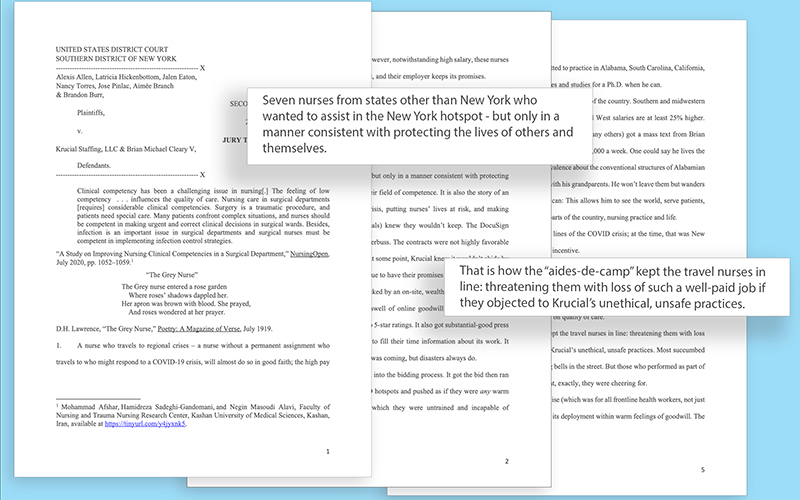
A federal lawsuit filed last year by New York lawyer Gregory Antollino alleges misdeeds by Krucial Staffing in the way it worked with travel nurses brought to New York City to respond to the pandemic. (Graphic by Isaac Stone Simonelli/Special for Cronkite News)
Travel nurses take action
A review of COVID-19-related federal lawsuits from January 2020 to early April 2021 identified four labor-related claims by travel nurses against medical facilities and travel nurse staffing agencies. The lawsuits focused on unsafe working conditions and disputes over pay and contracts.
Lack of personal protective equipment led travel nurse Diana Lange, along with other travel nurses, to file a lawsuit against 24-Hour Medical Staffing Services in California.
Winnie Kagendo sued Atlas Medstaff and several companies, including the Permanente Foundation, claiming she was fired from her job as a travel nurse “after she complained about having to care for a COVID-19 positive patient without an N95 mask.”
Krucial Staffing, an agency that responded to the March 2020 surge of COVID-19 cases in New York City, has come under fire in two lawsuits filed by travel nurses.
Gregory Antollino, who represents the plaintiffs in both suits, said many travel nurses feared losing their jobs or facing disciplinary action from state nursing boards for speaking out about lack of access to masks and other personal protective equipment and the work they were being asked to do.
The nurses were required “to work outside of their fields of competence – not just specialty, but competence,” according to court documents.
Referring to Krucial Staffing, Antollino said, “They didn’t know what they were doing with regard to the pandemic. They didn’t know things that they should have known as a nurse staffing agency deploying workers to work in COVID-19 places.”
Krucial Staffing declined an interview for this article but responded by email.
“As for the lawsuits in question, they are still in litigation so nothing specific can be said about them. Krucial Staffing has issued past statements denying the claims being made and continues to defend itself against the charges,” the email said.
Although Antollino is handling only two cases, he said he has been contacted by nearly 100 travel nurses considering legal action.
In light of the additional pressures and safety concerns associated with the pandemic, the federal Occupational Safety and Health Administration, which regulates workplace safety, created a new category of complaint for COVID-19-specific working violations.
In Arizona, health care workers filed more than a dozen COVID-19-related complaints to OSHA against hospitals, citing violations from a lack of PPE to quarantine policies.
One OSHA complaint against Banner-University Medical Center Phoenix states that the hospital required employees to reuse PPE, did not follow the Centers for Disease Control and Prevention guidelines for social distancing and that “employees do not have access to readily available personal protective equipment to prevent the spread of COVID-19.”
The complaint, filed at the start of the pandemic when the nation was facing a PPE shortage, estimated that 10,000 employees were impacted by such workplace safety issues.
Banner-University Medical Center declined an interview but responded by email.
“Banner has adhered to the CDC’s COVID-19 guidelines,” wrote David Lozano, a spokesman for Banner Health, Arizona’s largest health care network and largest employer. “If there were isolated instances where a protocol was not followed, we investigate them and take any necessary steps.”
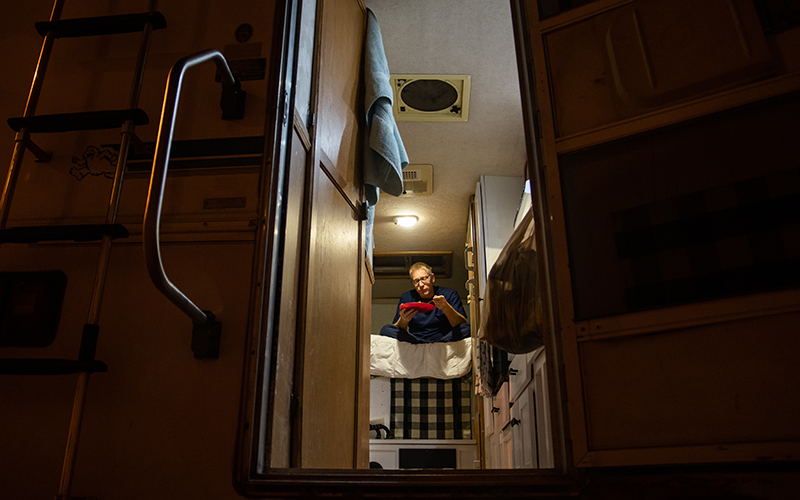
David Ryan, a travel nurse for six years, says he’s in a good place to deal with the stress of working during the pandemic, but he knows others have struggled. “I’m hoping that the people that have a really hard time get the help they need because you could see some serious post-traumatic stress syndrome.” (Photo by Isaac Stone Simonelli/Special for Cronkite News)
Coping with burnout
Hopper said he was drawn to New York at the onset of the pandemic by a sense of ethical duty. Yet more than once he found himself rushing into a COVID-19 patient’s room when their vitals became critical without the necessary mask pulled over his face.
Some patients survived but many didn’t.
“If you don’t rush into that room, within the next 30 seconds, that patient is going to die,” Hopper said. “We are putting the lives of our patients before ourselves.”
More than 560,000 people have died of COVID-19 in the U.S. since February 2020 – and that number is climbing. Travel nurses interviewed for this story acknowledged the mental health toll accompanying the loss of so many people in their care.
“We’ve worked an exceptional amount of hours,” Hopper said. “We’ve been in very dangerous situations. We’ve been in very high stress situations. The expectations that have been placed on us are extraordinary.
“Who’s there to support the health care workers?”
Experts agree that losing patients at the rate frontline workers have throughout the pandemic has been traumatic, increasing burnout and leading to mental health worries.
“Self-care isn’t a priority anymore,” Shawd said. “It’s just like you go to work, you’re mentally, emotionally drained. You come home and just pass out and go to bed. And then wake up and do it again.”
Hopper said mental health problems in nurses can often look like post-traumatic stress disorder, sometimes accompanied by addiction.
“This is the dark side of the pandemic that no one wants to discuss,” he said.
Experts in the medical industry suggest travel nurses in particular may be at high risk for burnout.
“I think we’ll see a pretty large exodus of health care professionals out of the industry for this,” said Hudson, of Avant Healthcare Professionals, whose agency conducted a 2021 survey focused on the industry’s response to the pandemic. “COVID’s not going away – and, who knows what the next pandemic is going to be.”
Relocating and working with a new team are just two of the unique challenges travel nurses face, said Robert Longyear, an executive at Wanderly, a digital marketplace for travel nurses. Often, these nurses are given the more difficult patients because they make higher wages than staff nurses, he said.
“The travel nurses who are going from hot spot to hot spot aren’t getting any relief,” Longyear said.
Hospitals and agencies have recognized the need for mental health resources for their staff. Hall, the travel nurse, said hospitals frequently have an employee assistance program that provides a hotline nurses can call for emotional support.
Cade Webb, lead marketing associate for AHS Staffing, said the agency offers these benefits through their insurance. There are also other resources available, such as the RNconnect 2 Well-being, a free Arizona Nurses Association program that sends self-care text messages.
Arizona and many other states have begun to lift mask mandates and social distancing requirements, worrying health experts who warn of a possible “fourth wave.” COVID-19 cases started to rise again in March.
As soon as the dust settles from COVID-19, experts believe there could be a mass departure of skilled nurses from the industry.
One recent survey of nurses by the American Association of International Healthcare Recruitment found more than a third of nurses polled are considering leaving the profession.
After more than a year on the front line, Hopper is one of them.
“I’ve been working in critical care for seven years,” he said. “And I’ve never been faced with the challenges that we have right now. Once we’re through the problem, I’m exiting this profession, because I don’t want to have to deal with this again.”
This article was produced by the Howard Center for Investigative Journalism at Arizona State University’s Walter Cronkite School of Journalism and Mass Communication, an initiative of the Scripps Howard Foundation in honor of the late news industry executive and pioneer Roy W. Howard.
